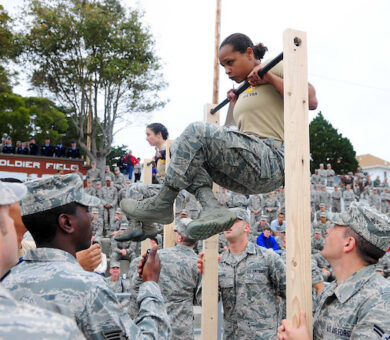Leadership Lessons for Student Athletes
What are some of the top characteristics good leaders have? Most people could come up with a pretty extensive list, but here are four simple techniques you can use when you are put in leadership roles.
Be a Competitor
If you are leading a group of people, and you are a fierce competitor, you're more likely to gain followers than if you were one of the non-competitors. Whatever the team goal, there is an increased chance of attaining it if there are competitors. What's more, if the leader is a known and demonstrated competitor, it will positively affect the entire team.
Obstacles to Competitiveness
Sometimes you, and even leaders, just don’t feel like competing. You've had a hard day or you're struggling with some part of your game. There are lots of potential reasons why you may not feel like being competitive on a particular day.
Here's a short list:
- You’re tired.
- You’ve had a hard day.
- You're going through some difficulties in life.
- You're mad about something.
- You don’t understand why you have to do something.
- You disagree with an assignment (or the drill in sports).
You’re only human, right? Well, as a leader, and as a student athlete, you hold yourself to a higher standard. Of course there are days when this is harder than others, but this what sport teaches you.
Give all you can as long as you can.
What to do when your competitiveness wants a day off:
- Positive self-talk
- Recalibrate; change the framework
- Breathe
- Focus outward; focus outside your own situation (Example: Focus on the task at hand or on helping a teammate.)
- Ask yourself what your coach would want you to do
Respect Yourself and Others
Most people probably think they respect themselves and others, but actual respect goes deeper than most recognize.
Respecting yourself means you care about yourself and are willing to take care of yourself to the best of your ability.
Things to think about:
- Have you ever not gotten enough sleep?
- Have you ever cheated on a test?
- Have you ever skipped a repetition in a drill during practice?
- Have you ever put yourself in danger?
Respecting others means you deal with people and have no judgment, even with those who don’t look, think, or act like you. Your teammates, who aren't likely your best friends, fall into that category, too.
Things to think about:
- Have you ever looked at someone and made a judgment about the way they look, their weight, their clothes, or their talent level?
- Have you ever walked into a room and chose to sit far away from someone who looked different than you?
- Have you ever thought you shouldn’t have to follow the same rules that the non-athletes at school have to follow?
- Have you ever cut in line or stolen?
- Have you ever joked with friends about a person who was not popular at school?
- Have you ever been disrespectful to a teacher or coach behind their back?
- Have you ever gotten a laugh or an applause by making fun of someone else?
These are just some examples of ways you can catch yourself, and others, acting disrespectful.
Communicate
One thing that makes leaders great is their ability to communicate clearly. Communicating is so important to people leading teams. Simply put, when everyone is on the same page, team performance improves.
In communicating, leaders can’t be afraid to be unpopular and must speak the truth. They communicate clearly what needs to be done by the group. They give direction and then support the mission.
Good leaders also use their communication skills to uplift the members of the team. They encourage, support, and praise their teammates whenever they have the opportunity.
Go Beyond Your Sport
To become a great leader, you have to look beyond just your sport. Leadership is something that you can value and use throughout every aspect in your life. If you are only a leader in your sport, you are not preparing for the leadership you will need, and that others will value, when you're done playing.
When you practice leadership outside of sport, it becomes your norm. These skills will be used later in life when you are interviewing for jobs, living your career, leading your communities, and raising a family.




